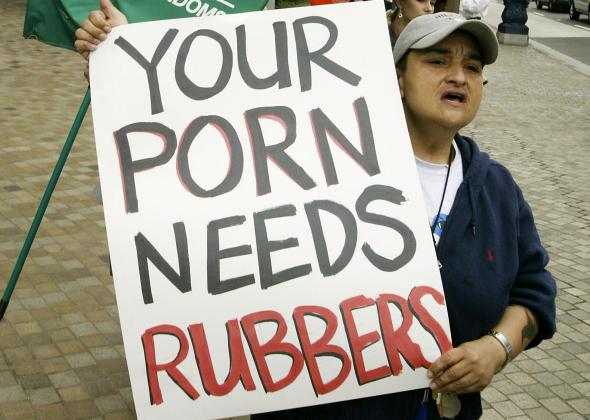On Monday, the 9th Circuit ruled that a Los Angeles ordinance requiring adult film actors to wear condoms during shoots does not violate the First Amendment. Although the court acknowledged that filming sex qualifies as constitutionally protected expression, the judges unanimously decided that the condom mandate imposed “only a de minimis effect on expression” and could be justified on health and safety grounds.
This is the wrong ruling for the right reasons. The 9th Circuit faithfully applied two relevant (if muddled) Supreme Court precedents, Erie v. Pap’s A.M. and Los Angeles v. Alameda Books, in dismissing the free speech rights of pornographers. In Erie, a fractured court held that Indiana could ban nude dancing entirely because it believed (with little evidence) that the activity caused “negative secondary effects.” In Alameda, the justices found that Los Angeles could forbid adult bookstores from operating within 1,000 feet of another adult establishment. Again the court relied on the “secondary effects” theory, accepting Los Angeles’ dubious assertion that a concentration of adult bookstores somehow spurs crime.
The problem with Erie and Alameda is that they are transparently results-oriented, brazenly ad hoc, and utterly out of line with our First Amendment traditions. Neither Indiana nor Los Angeles could show with any certainty that nude dancing and adult bookstores caused “secondary effects” such as indecent exposure or sexual assault. Instead, legislators were concerned with the purportedly immoral message behind the expression in question. Nude dancing conveys eroticism with unparalleled intensity; adult bookstores, which often have viewing booths for films, contain vivid images of explicit sexuality. These graphic qualities are what make nude dancing and pornography so effective as a means of communicating ideas.
Usually, the government doesn’t get to muffle speech just because it’s effective. That proposition, in fact, was the underpinning of Citizens United. In that case, the court decided that corporations must be allowed to spend an obscene amount of money producing ads that disproportionately influence voters. Just because speech is effective, the court noted, doesn’t make it censorable. After all, speech is supposed to be effective, and the government can’t stifle expression just because it’s especially good at conveying certain ideas. With Erie and Alameda, however, a majority of the court abandoned that bedrock principle, implying that erotic expression was of minimal First Amendment value and granting legislatures wide latitude to censor it on some laughable pretext.
And that’s pretty much what’s going on in Los Angeles. Supporters of the condom mandate insist that it is designed to protect performers. Yet adult film actors have consistently and vehemently opposed such measures, insisting that current industry standards and regulations ensure their sexual safety. So advocates of the mandate have turned to a backup argument: the notion that the law is necessary to protect the residents of Los Angeles, who may be at risk of catching an STI from porn actors. This claim also registers as pretext in a world where porn actors undergo vastly more rigorous and regular testing than the population at large.
What, then, is the true purpose of the condom mandate? That’s pretty obvious: to forbid any studio from creating films that encourage unprotected sex by depicting it as sexier or more fun than safe sex. When people watch condom-free porn, they may well become convinced that sex without condoms is superior to sex with condoms. They may even decide to abandon condoms altogether. Los Angeles wants its citizens to engage in safe sex; that is, no doubt, a noble goal. But it shouldn’t be allowed to pursue this objective by forbidding studios from promoting unsafe sex through graphic (and thus highly persuasive) expression.
There is some good news in the 9th Circuit’s decision. A lower court already blocked much of the condom mandate from going into law last year, holding that a provision forcing studios to obtain a permit before filming qualified as an unconstitutional prior restraint. (Studios that jettisoned condoms could, under the blocked provision, be shut down by the government.) The 9th Circuit affirmed this ruling, which effectively defangs the law of its primary enforcement power.
It is unclear, then, how the condom mandate can be implemented after Monday’s decision—meaning the 9th Circuit may have quietly let porn studios off the hook. Still, the usually speech-friendly court’s willingness to accept Los Angeles’ spurious arguments is disappointing, even if the Supreme Court itself laid the groundwork. Los Angeles is free to encourage its residents to use condoms during sex. But if some pornographers want to send a different message, Los Angeles shouldn’t have the power to shutter their studios.
